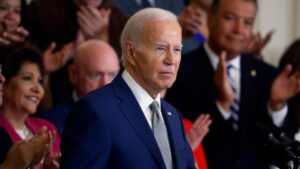The recent findings from an investigation by Sen. Joni Ernst highlight the alleged misallocation of $18 million in taxpayer money to Chinese projects, raising concerns over transparency in federal spending. The report suggests that millions are unaccounted for in federal databases, igniting discussions on the appropriateness of supporting initiatives in a nation deemed hostile by some lawmakers.
Investigation Uncovers $18 Million in U.S. Taxpayer Funds Sent to China

Investigation Uncovers $18 Million in U.S. Taxpayer Funds Sent to China
A report led by Sen. Joni Ernst reveals significant discrepancies in U.S. funds allocated to projects in China, prompting a call for greater accountability and transparency.
Article text:
A comprehensive investigation initiated by Sen. Joni Ernst (R-IA) has uncovered the alarming revelation that the Biden administration has reportedly diverted $18 million in U.S. taxpayer funds to Communist China. This revelation is further compounded by the fact that a significant portion of the funds appears to be either concealed or improperly reported in federal spending databases, leading to heightened outrage among lawmakers and accountability advocates alike.
The investigative report indicates that at least $4 million of the funding went untracked or misrepresented on USAspending.gov, the official government platform designed to provide transparency on grant allocations. The financial distribution was primarily facilitated by the State Department and the Department of Health and Human Services (HHS) for various initiatives based in China, which include:
- Diversity, Equity, Inclusion, and Accessibility training at U.S. consulates
- Pro-LGBT events occurring within China
- Art projects such as billboards and bicycle parking covers
- Climate change-related efforts
- Research programs focused on rats
Furthermore, the investigation revealed that Peking University in Beijing received a staggering $4.8 million for its "China Health and Retirement Longitudinal Study." However, an additional $1.08 million, directed to researchers at Peking, was found to be concealed within a subaward related to a grant issued to the University of Southern California. This grant was primarily aimed at investigating brain sensors linked to cognition, addiction, and mood but failed to disclose the subaward on Peking University’s profile in the USAspending.gov database.
An audit conducted by the Government Accountability Office (GAO) in April 2023 corroborated that U.S. financial resources frequently end up in Chinese programs through subawards, yet it also cautioned that the full magnitude of this issue remains unclear due to significant gaps in data reporting and transparency.
Sen. Ernst criticized the Biden administration for what she terms the misuse of taxpayer dollars, arguing that American funds should not be utilized to support a regime perceived as antagonistic, especially when such spending lacks transparency and accountability.
A comprehensive investigation initiated by Sen. Joni Ernst (R-IA) has uncovered the alarming revelation that the Biden administration has reportedly diverted $18 million in U.S. taxpayer funds to Communist China. This revelation is further compounded by the fact that a significant portion of the funds appears to be either concealed or improperly reported in federal spending databases, leading to heightened outrage among lawmakers and accountability advocates alike.
The investigative report indicates that at least $4 million of the funding went untracked or misrepresented on USAspending.gov, the official government platform designed to provide transparency on grant allocations. The financial distribution was primarily facilitated by the State Department and the Department of Health and Human Services (HHS) for various initiatives based in China, which include:
- Diversity, Equity, Inclusion, and Accessibility training at U.S. consulates
- Pro-LGBT events occurring within China
- Art projects such as billboards and bicycle parking covers
- Climate change-related efforts
- Research programs focused on rats
Furthermore, the investigation revealed that Peking University in Beijing received a staggering $4.8 million for its "China Health and Retirement Longitudinal Study." However, an additional $1.08 million, directed to researchers at Peking, was found to be concealed within a subaward related to a grant issued to the University of Southern California. This grant was primarily aimed at investigating brain sensors linked to cognition, addiction, and mood but failed to disclose the subaward on Peking University’s profile in the USAspending.gov database.
An audit conducted by the Government Accountability Office (GAO) in April 2023 corroborated that U.S. financial resources frequently end up in Chinese programs through subawards, yet it also cautioned that the full magnitude of this issue remains unclear due to significant gaps in data reporting and transparency.
Sen. Ernst criticized the Biden administration for what she terms the misuse of taxpayer dollars, arguing that American funds should not be utilized to support a regime perceived as antagonistic, especially when such spending lacks transparency and accountability.























